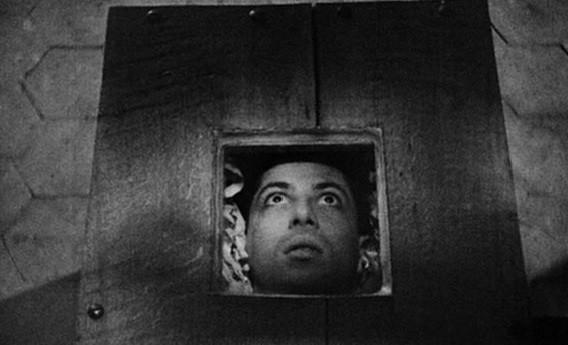What is a duel? It's a type of fight. Not just any fight. Were this film called 'Fight,' it would lose a lot of its force. A fight doesn't have the implications a duel has. A duel has stakes of honour and power. The winner is superior, the 'better man'; the winner has shown he has the more powerful hand, the swifter blade. The duel is about two things: power and speed. And Duel the film is about power and speed as well.
The bulk of dialogue in Duel occurs in the opening fifteen minutes. This section serves as a sort of thematic introduction. It gives you the conceptual tools to understand just what's going on in all you witness from there on in. The radio conversation we hear as David Mann drives along is of a radio DJ calling the census bureau and jokingly giving a story of how he can't claim to be the head of his household even though he's the man of the house; how this is humiliating for him; and how he is a 'househusband' who wears a dress and slippers all day. We also get a glimpse into David's life as he calls his wife to apologize for a fight. It seems they were at a social gathering and he didn't stop a man from hitting on his wife--she describes it as practically attempted rape. There are clear implications here that David is henpecked and not able to stand up for himself. He's a wimp. He doesn't drive fast and is probably destined to remain in middle management. He is probably not terribly respected, otherwise men wouldn't try to seduce his wife in front of him. Defending his wife shouldn't have been a point of treating her like property; it should have been a point of fending off a serious breech of respect and not allowing himself to be humiliating and overpowered. So that's David and those are the themes.
Then the duel begins, over an hour of the movie dedicated to the one cat-and-mouse game. Duels in swashbucklers were with swords; duels in westerns were with guns. Yes, duels really were carried out with those items, yet they are clear phallic symbols. These instruments of the duel are themselves symbolic of what's at stake in the duel. One has a cockfight in both meanings of 'cock'. What could be even more phallic than a gun and a sword? Why, vehicles of course! David's bright orange car against a semi: can David out-power or out-run the semi?
The stakes of this duel have been set up in those opening twenty minutes: David's masculinity, his power. When he overtook the truck, he was just trying to escape the fumes. Clearly the driver took this as an offense. He took it as a statement of power. The driver then overtakes David to reassert himself. Later when David waves him past, the driver seems only more furious and repeatedly taunts David with the wave-past throughout the film, because it implies a giving of permission. The whole film works by power dynamics.
David has an interior monologue running throughout the film. At the mid-way point, after his first failure in the duel, he stops in a truck stop and ponders approaching the people he believes might be the driver. He's still very meek but is considering standing up for himself. His thoughts on what he should do generally illustrate the effects the events are having on him, but otherwise the visuals do the work of illustrating the plot. Still beyond the mid-way point he can only ineffectually tell children not to sit on the hood of his car. Nor can he help successfully give push to a bus that the trucker has no trouble pushing. It is not until the end that he finally decides he can't run or hide any more, he has to fight using his wits. The decision to fight is probably more important than whether he wins or not.
It would be a stretch to call Duel a bildungsroman. This is really all one event taking place in a few hours. I'd label Duel a 'turning-point film'. Turning-point films generally consist of meek people going through extreme situations and gaining the inner strength to be more assertive. While She Was Out is an example of a turning-point film. In While She Was Out, we are treated to a before and after, seeing how the heroine of that film uses her experience to take control of her life and dominate her abusive husband. Strangely, Matheson doesn't give us that satisfaction: after seeing David win the duel, we never get to see him go home and kick ass. We are left to imagine what sort of impact the event will have on his life. I think that is a wise decision.
So, Duel is about as masculine a film as one could ask for; its themes all directly concern men and the power dynamics between them, the psychosocial implications of those power dyanmics, and the symbolic representations of these dyanmics in cinema (swashbucklers, westerns). Hopefully anyone watching the film comes away a little less innocent, a little more aware, and with a new hair on his/her chest.
Help make this site more interesting through discussion:
Spielberg's Duel and the Masculine Threat
Author: Jared Roberts
Subscribe to:
Post Comments (Atom)


0 comments:
Post a Comment